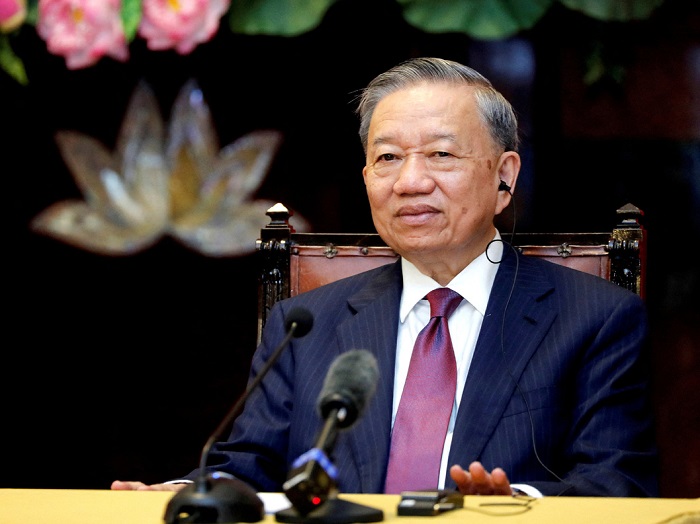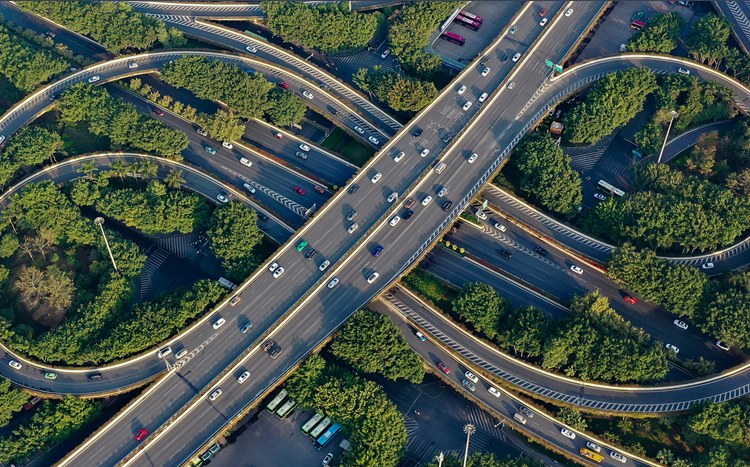China, Vietnam start new chapter of traditional ties

File photo of To Lam. [Photo/Agencies]
That Vietnamese President To Lam chose China as the destination of his first foreign state visit after being elected as the general secretary of the Central Committee of the Communist Party of Vietnam (CPV) shows the new Vietnamese leadership attaches great importance to its relations with its northern neighbor. Lam's three-day visit to China that concluded on Tuesday will help carry forward the Sino-Vietnamese relationship.
Chinese President Xi Jinping, also general secretary of the Communist Party of China Central Committee, pointed out that the CPC and the CPV have passed down their shared ideals and beliefs from generation to generation, forging the traditional friendship of "comrades-plus-brothers" between the two countries.
Lam has vowed to enhance the Vietnam-China comprehensive strategic cooperative partnership, and push forward the building of the Vietnam-China community with a shared future that carries strategic significance, firmly pursue the one-China policy and support China in achieving national reunification.
The important talks, as well as a series of concrete bilateral cooperation agreements on industry, finance, education and health, etc, show China and Vietnam have begun a new chapter of traditional friendship.
Strategic significance to both countries
First, during the Chinese President Xi Jinping's state visit to Vietnam in December last year, the two sides agreed to build a China-Vietnam community with a shared future, which carries strategic significance for the comprehensive strategic cooperative partnership between the two countries.
During Lam's visit both parties have unequivocally stated their commitment to advancing the establishment of a China-Vietnam community with a shared future through tangible actions. And Lam has reiterated that the new Vietnamese leadership will continue the Southeast Asian country's foreign policy vis-à-vis China.
Second, Lam has indicated that his country wants to develop friendly political relations with China by increasing communication and engaging in mutually beneficial cooperation. The fact that China and Vietnam are both socialist countries makes their inter-party communication a distinctive feature of the overall bilateral relationship.
The top Chinese leader and late CPV Central Committee general secretary Nguyen Phu Trong exchanged visits three times, and the two sides' senior leaders visiting each other's country several times, which is unprecedented in the history of the two countries. In fact, the two countries' deep understanding has facilitated the development of bilateral relations. As the new top leader of Vietnam, Lam has a clear understanding of the complexity of China-Vietnam relations, and his visit to China is expected to help bring the top leaders of the two countries maintain stable, and promote the long-term development of bilateral relations.
Visit to boost economic ties
Third, Lam's visit will inject new momentum into the two sides' economies. Since the Chinese top leader's visit to Vietnam last year, the two countries have been engaging in high-quality trade and economic cooperation. According to China's official data, the two-way trade volume hit $145 billion in the first seven months of this year, with China continuing to be Vietnam's largest trading partner and leading investor in new projects in the country.
Vietnam media reported that China is still the largest consumer of Vietnamese fruits and vegetables, with its imports in the first half of this year accounting for 64 percent of Vietnam's total exports of agriproducts. China is also the largest market for Vietnam's durian exports, accounting for 92.4 percent of the total exports of the fruit by Vietnam.
Of course, the two sides are aware that the trade traffic bottleneck has seriously restricted their economic exchanges because of Vietnam's unnecessary security concerns. Fortunately, the spillover effects of the China-Laos Railway have reduced some of Vietnam's security concerns and Lam's visit may help improve infrastructure connectivity between the two sides.
In the first seven months of 2024, a total of 6,850 twenty-foot equivalent unit (TEU) containers of goods were shipped via China-Vietnam freight trains departing from south China's Guangxi Zhuang autonomous region, marking a 16-fold increase year on year.
Fourth, China and Vietnam can promote people-to-people exchanges because people-to-people bonds are an important part of international relations. In recent years, cultural exchanges between the two sides have flourished, with more than 23,000 Vietnamese students studying in China. People-to-people exchanges have the potential to enhance the perception of Chinese people among certain Vietnamese individuals, which may have been distorted due to conflicts and external influences during certain periods.
Fifth, China and Vietnam are expected to manage their differences and improve bilateral relations by overcoming the existing and emerging challenges, not least because they have vowed to prevent individual issues from affecting their overall relationship.
The South China Sea issue is the source of the biggest difference between the two countries. The Chinese government issued a statement in March on the baseline of the northern part of the Beibu Gulf, which was not welcomed by Vietnam. And in July, China firmly opposed Vietnam's submission to the United Nations Commission on the Limits of the Continental Shelf to extend its undersea shelf in the South China Sea, and lodged stern representation with the Vietnamese side on the issue.
However, since both China and Vietnam have made the pursuit of peace and development in the region a main goal of their foreign policy, they are not likely to intensify their disputes over the South China Sea. Instead, during Lam's visit, both sides said they should better manage the differences and prevent the disputes from escalating.
China has achieved the goal of building a moderately prosperous society in all respects by 2020, while the year of 2021 marks the centennial anniversary of the founding of the CPC, and is pursuing to build a modern socialist country that is prosperous, strong, democratic, culturally advanced and harmonious by the middle of this century, while 2049 marks the centennial anniversary of the founding of the People's Republic of China.
On the other hand, Vietnam's two centennial goals are to develop the country into a modern industrial base and upper-middle income society by 2030, the centenary of the founding of the CPV, and transform the country into a high-income society by 2045, the centenary of the establishment of the Socialist Republic of Vietnam.
And sixth, Vietnam's "bamboo diplomacy" allows it to develop comprehensive strategic partnership with many countries and continue to view its relations with China as the top priority in its foreign policy. That's why Vietnam is not likely to join any bloc to constrain or isolate China, because it acknowledges that China has helped it become a peaceful and prosperous country. In short, Vietnam will not become a tool of other countries to check China's peaceful rise.
Although Vietnam has been developing its relationship with the United States and hopes to upgrade Hanoi-Washington ties, the US has not removed Vietnam from its list of countries to which export of advanced technologies is restricted, and continues to consider Vietnam a non-market economy. Also, Vietnam has realized the US' true intention of driving a wedge between Beijing and Hanoi to fulfill Washington's narrow political goals.
Hence, China and Vietnam are expected to deepen cooperation and fulfill their responsibility of safeguarding regional peace and promoting development. In short, although China and Vietnam differ on certain issues, the differences will not dictate their overall relationship.
The author is an associate professor at the School of International Studies, Nanjing University. The views don't necessarily reflect those of China Daily.
The views don't necessarily reflect those of China Daily.
If you have a specific expertise, or would like to share your thought about our stories, then send us your writings at opinion@chinadaily.com.cn, and comment@chinadaily.com.cn.














